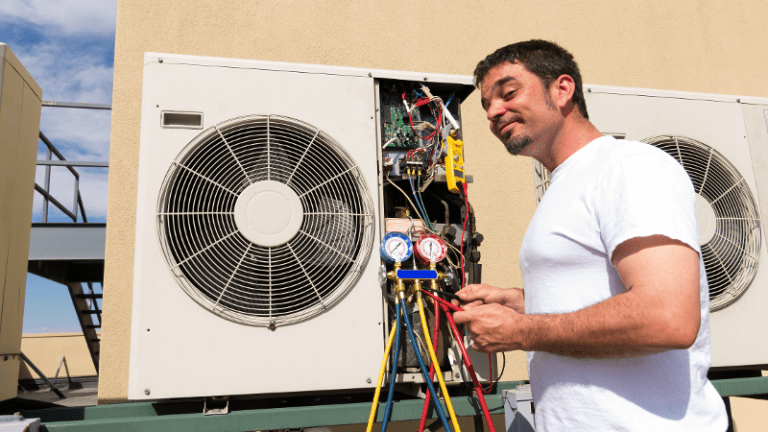An industrial HVAC system works even harder than the average commercial building HVAC. It’s often the case that if the industrial HVAC fails, the work environment is not safe. That can cause major production delays with lasting repercussions.
Luckily, an industrial HVAC system uses all the basic principles of any other such system. The scale is bigger, and the stakes are higher, but getting the most from your system relies on just a few crucial basics. Given that, there are common questions that come up regularly.
Let’s take a closer look at some questions and answers about industrial HVACs:
1. “What are the most common problems with industrial HVAC systems?”
The compressor is perhaps the most important single component within the industrial HVAC system. Surprisingly, though, years of experience show the majority of HVAC woes are not caused by the compressor. There are only two exceptions to be aware of:
If the compressor is more than five years old, it is on the back end of its service life and is likely to see a decline in efficiency. The average compressor will operate for eight years without issue and may last to ten years, but a highly demanding industrial workplace could cut years off that figure.
If the working environment is hazardous in terms of extreme temperatures, aerosolized pollutants, and other issues, it’s especially important to be careful with maintenance. Simple human oversight – such as leaving the compressor partially exposed after maintenance – can be devastating.
For the majority of organizations, flooding and slugging are the most common HVAC compressor issues that lead to failure. But four out of five times, typical industrial HVAC problems have nothing to do with the compressor. That said, unresolved mechanical faults adversely affect the compressor over time.
Insufficient or incorrect refrigerant is the most common industrial HVAC problem. Monitor refrigerant levels and check for line leaks if the amount diminishes faster than planned. Inconsistent temperature performance is often caused by blocked air ducts (change filters) or thermostats needing calibration.
2. “What is the best way to maintain an industrial HVAC compressor?”
Any industrial HVAC compressor will have maintenance needs on a weekly, monthly, quarterly, and annual basis. An HVAC maintenance checklist is a terrific way to make sure nothing gets overlooked.
Whenever maintenance is performed, be sure that all observations, changes, and replacements are fully documented. You should also maintain an inventory of all compressor spare parts you have on hand.
The right spare part can be the difference between a quick fix and several days of downtime. Since your compressor itself may need components replaced occasionally, it’s wise to connect with an industrial compressor remanufacturer that can advise you on necessary parts and supplies.
3. “What is the best way to replace an industrial HVAC compressor?”
As a general rule, industrial HVAC systems should be replaced exclusively with the exact same make and model of compressor that was originally used. This can lead to a challenge because OEM-affiliated wholesalers may not have the exact make and model you require, leading to serious delays.
As a result, the best way to replace any industrial HVAC compressor is through remanufacturing.
With a remanufactured industrial compressor, the compressor core from your existing system forms the backbone of the new unit. This means you no longer have to wait for the most costly component to arrive. Your compressor remanufacturing team can get to work right away.
Compressor remanufacturing is an intensive engineering process that involves complete testing of all components and functions. Any damaged or underperforming components are replaced. After a full battery of tests, the final check is done under “simulated real-world conditions.”
The compressor is also cleaned inside and out. But while a “rebuilt” compressor might only have been cleaned, a “remanufactured” compressor has been fully restored. It is ready for another 8-10 years of service life and meets all the same environmental and performance standards it originally did.
On the whole, remanufacturing is both faster and less expensive than the alternative.
Not only do customers enjoy a discount that can range anywhere from 10% to 30% or even more, but they don’t have to be concerned about weeks or months of supply chain delay. By working with your remanufacturing team, you can trim thousands of miles off your own supply chain.
What’s more, remanufacturing cuts out the biggest source of pollution and waste in the process – the production of a new compressor core. This greatly reduces your company’s impact on the environment as well as your budget.
Your industrial HVAC compressor is a mission-critical piece of equipment. With these tips, you’re on the right track to keep it working effectively for years to come. For advice on a specific issue, reach out to a compressor remanufacturer who understands the intricacies of your HVAC system.












